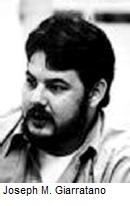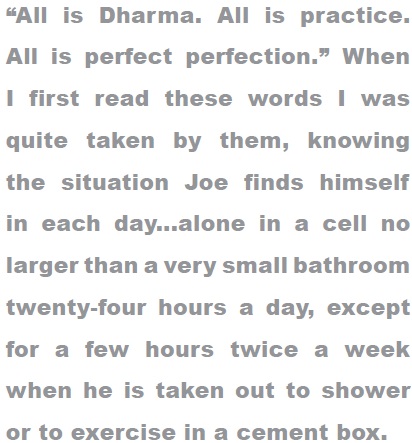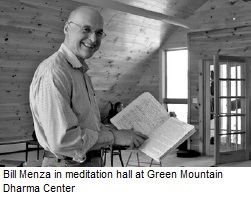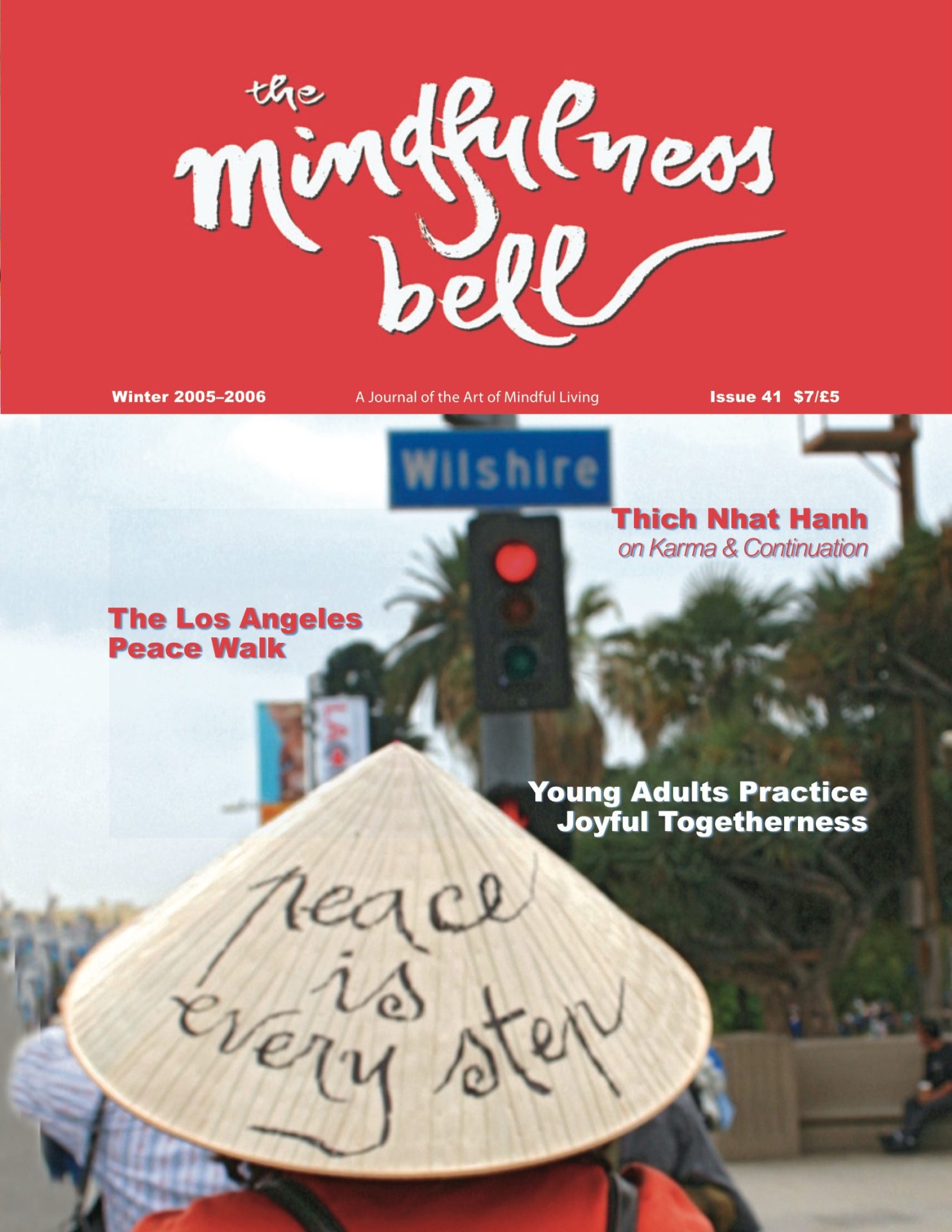“All is Dharma. All is practice. All is perfect perfection.”By Bill Menza

Joe Giarratano has been in prison for twenty-five years, many of those in solitary confinement in Virginia’s Red Onion supermax prison. I have been writing to Joe for about fifteen years, including his twelve years on death row, and the time he was exiled by Virginia prison officials to prisons in Utah and in Illinois.
“All is Dharma. All is practice. All is perfect perfection.”By Bill Menza

Joe Giarratano has been in prison for twenty-five years, many of those in solitary confinement in Virginia’s Red Onion supermax prison. I have been writing to Joe for about fifteen years, including his twelve years on death row, and the time he was exiled by Virginia prison officials to prisons in Utah and in Illinois. I first met Joe on death row when I accompanied Amnesty International representatives visiting four prisoners in 1982. All have been executed except Joe.
During his exile to Utah and Illinois I sent Joe information about the Four Noble Truths, the Eightfold Path, the Buddha, and Zen Master Thich Nhat Hanh. I told him I had found a way to deal with suffering as nothing else could. I told him that these tools were like a magical formula, that they made my life more calm, peaceful, and joyful. I suggested that he study and practice the teachings of the Buddha. I believe that the practice of the Way has saved Joe’s mind and body many times from the hells and insanity that supermax prison confinement inflicts on prisoners. Supermax prisons are based on research of Nazi prisons and the brainwashing of POWs by the North Koreans. They are non-human environments that aim to make prisoners completely compliant, as well as to punish them continuously.

Practicing in Hell
“Generally,” Joe writes, “I am holding up well under the rigors of supermax segregated confinement. Nevertheless, I know that anyone subjected to this type of ordeal––especially for long durations––does not escape unscathed. From experiences with long-term isolated segregated lockdowns, i.e., my years on the row, I know the tremendous amount of mental concentration it requires just to keep one’s head above water. There are times, even now, when I’m not so sure of my own grip on reality… More and more, I find myself having to turn inward just to maintain my balance in this madness; and even then, I must remain on guard for hallucinations, for feelings of suffocation, paranoia, fear, and rage.”
Joe has been a good student of the Buddha. He has studied as much as is possible given the environment, and has passed the books and articles on to the prison library. Unfortunately, Virginia prison officials have now sealed all cell doors with hard rubber gaskets, so that prisoners cannot pass on papers or books, or talk to each other through the small space at the bottom of their cell doors.
Some of Joe’s letters have helped me and others have a more compassionate view of prison guards and officials by helping me understand more deeply that they too are human beings caught by many causes and conditions. Joe often begins or ends his letters with the statement: “All is Dharma. All is practice. All is perfect perfection.” When I first read these words I was quite taken by them, knowing the situation Joe finds himself in each day. He is alone in a cell no larger than a very small bathroom twenty-four hours a day, except for a few hours twice a week when he is taken out to shower or to exercise in a cement box. Exiting from his cell, he is handcuffed around the wrists and hands with a chain around his waist to which a dog chain is attached, chains around the ankles, and armed guards nearby. He receives food through a slot in the door of his cell.
Joe had been sentenced to death by a Norfolk, Virginia judge for a double murder. But after an international campaign for clemency, in 1991 his sentence was commuted to life with a recommendation for a retrial. Appeals came from Amnesty International, the Pope, the European Parliament, the Irish government, and thousands of individuals. But no retrial has taken place. The campaign developed from serious doubts about his guilt and the defectiveness of the judicial process that convicted him. (A recent report by the Virginia American Civil Liberties Union, Broken Justice: The Death Penalty in Virginia, concludes: “Virginia’s criminal justice system is crippled by procedures that fail to ensure a reliable determination of guilt or innocence.”)
Jailhouse Lawyer
The campaign was also conducted because Joe had become an extraordinary rehabilitated prisoner, educating himself in law and the classics. He successfully filed two briefs to the U.S. Supreme Court for two other inmates while on death row.
One brief was about the lack of legal counsel for prisoners on Virginia’s death row in violation of the U.S. Constitution. Joe was trying to save fellow death row inmate Earl Washington, who did not have a lawyer and was a few days from being executed. Earl is a developmentally disabled African American who was exonerated in 2003 for the murder of a woman in Culpeper, Virginia. Police there had coached Earl into confessing to a murder he had not committed, and he was given an inadequate defense at his trial.
Recently, Joe filed motions in Federal Court to have the Virginia Department of Corrections follow standard medical procedures in testing a prisoner with a hepatitis C infection so the extent of his illness can be determined and drug therapy initiated. This is in response to a policy held by many state prison systems, of not adequately testing infected prisoners so drug treatment will not be required. This saves them money.
Joe has always been a passive and respectful prisoner. He has encouraged others to file grievances rather than to react violently. After he was removed from death row he set up a peace studies course among the most violent prisoners which was copied by other prisons in the U.S. Nonviolence teacher and columnist Coleman McCarthy helped Joe develop the twelve-week course called “Peace Studies: Alternatives to Violence.” At the commencement ceremony for the first class of graduates, peace diplomas were passed out and each participant came forward to say, in one way or another: “If I had known about nonviolence when I was a kid, I probably wouldn’t be in this place today.”

While he was incarcerated in Utah, Joe worked with the American Civil Liberties Union and the U.S. Department of Justice to expose abuse of prisoners, including the death of a young man strapped to the “devil’s chair.” Prisoners are strapped head to toe to this metal chair. Unable to move at all, there is a hole in the seat so urine and excrement can fall into a bucket. It is meant to be used on unruly prisoners for only a couple of hours at a time. The prisoner who died had been kept in the chair for several days, dying from the blood clots that form when there is no body movement. Joe’s work caused the director of the prison, a former military prison officer, to resign, and the gross mistreatment of prisoners there to be stopped.
Zen and the Art of Law
At the Illinois prison Joe taught a class titled “Zen and the Art of Law” to young gang leaders. Because of this, the warden had Joe placed in solitary confinement. Today, Joe rarely receives a visitor, partly because Red Onion Prison is located in a remote part of southwestern Virginia. When visiting, the prisoner and the visitor sit in phone booths and speak on a phone. There is no personal contact, but they can see each other through the plastic wall that separates them.
In 2004 the American Association on Mental Retardation honored Joe with their Dybwad Humanitarian Award for his efforts on behalf of Earl Washington. And this year American University gave Joe a Peacemaker Award for his work on behalf of prisoners and with students at the Center for Teaching Peace, founded by Coleman McCarthy.
Recently a team of lawyers has begun working to have the evidence used to convict Joe reviewed. Unfortunately, the evidence used at his trial, which did not connect him to the murders, has been lost by the Norfolk police. Additionally, Virginia’s draconian laws prevent the courts from looking at new evidence after a conviction, except for DNA evidence in special situations.
Joe’s legal situation and the conditions of his imprisonment bring a stronger meaning to his words: “All is Dharma. All is practice. All is perfect perfection.” These words remind me that all things are the Dharma, and therefore material for practice and transformation. Instead of responding to a prison hell with anger, hatred, and violence, Joe has shown that one can transform hellish conditions to better states.
I find these words coming from Joe and the hell realm in which he lives to be a powerful mantra, especially when I am working with my own difficulties and suffering. They help me see things as they really are, in process, in transformation. You might call it “perfect perfection.”
Dharma teacher Bill Menza, True Shore of Understanding, practices in Fairfax, Virginia and Washington, D.C. He has been a volunteer human rights worker for prisoners since 1975. If you would like to write to Joe Giarratano, contact Bill at bemetta@yahoo.com.

